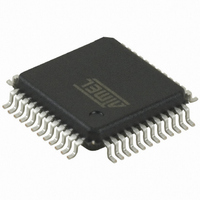AT32UC3B1256-AUR Atmel, AT32UC3B1256-AUR Datasheet - Page 88

AT32UC3B1256-AUR
Manufacturer Part Number
AT32UC3B1256-AUR
Description
MCU AVR32 256K FLASH 48-TQFP
Manufacturer
Atmel
Series
AVR®32 UC3r
Datasheet
1.AT32UC3B164-AUR.pdf
(680 pages)
Specifications of AT32UC3B1256-AUR
Package / Case
48-TQFP, 48-VQFP
Voltage - Supply (vcc/vdd)
1.65 V ~ 1.95 V
Operating Temperature
-40°C ~ 85°C
Speed
60MHz
Number Of I /o
28
Core Processor
AVR
Program Memory Type
FLASH
Ram Size
32K x 8
Program Memory Size
256KB (256K x 8)
Data Converters
A/D 6x10b
Oscillator Type
Internal
Peripherals
Brown-out Detect/Reset, DMA, POR, PWM, WDT
Connectivity
I²C, IrDA, SPI, SSC, UART/USART, USB
Core Size
32-Bit
Lead Free Status / RoHS Status
Lead free / RoHS Compliant
Eeprom Size
-
Available stocks
Company
Part Number
Manufacturer
Quantity
Price
Company:
Part Number:
AT32UC3B1256-AUR
Manufacturer:
OMRON
Quantity:
12 000
- Current page: 88 of 680
- Download datasheet (10Mb)
12. Interrupt Controller (INTC)
12.1
12.2
12.3
32059J–12/2010
Features
Overview
Block Diagram
Rev: 1.0.1.5
•
•
The INTC collects interrupt requests from the peripherals, prioritizes them, and delivers an inter-
rupt request and an autovector to the CPU. The AVR32 architecture supports 4 priority levels for
regular, maskable interrupts, and a Non-Maskable Interrupt (NMI).
The INTC supports up to 64 groups of interrupts. Each group can have up to 32 interrupt request
lines, these lines are connected to the peripherals. Each group has an Interrupt Priority Register
(IPR) and an Interrupt Request Register (IRR). The IPRs are used to assign a priority level and
an autovector to each group, and the IRRs are used to identify the active interrupt request within
each group. If a group has only one interrupt request line, an active interrupt group uniquely
identifies the active interrupt request line, and the corresponding IRR is not needed. The INTC
also provides one Interrupt Cause Register (ICR) per priority level. These registers identify the
group that has a pending interrupt of the corresponding priority level. If several groups have a
pending interrupt of the same level, the group with the lowest number takes priority.
Figure 12-1
accessed via the user interface. The interrupt requests from the peripherals (IREQn) and the
NMI are input on the left side of the figure. Signals to and from the CPU are on the right side of
the figure.
Autovectored low latency interrupt service with programmable priority
Up to 64 groups of interrupts with up to 32 interrupt requests in each group
– 4 priority levels for regular, maskable interrupts
– One Non-Maskable Interrupt
gives an overview of the INTC. The grey boxes represent registers that can be
AT32UC3B
88
Related parts for AT32UC3B1256-AUR
Image
Part Number
Description
Manufacturer
Datasheet
Request
R

Part Number:
Description:
DEV KIT FOR AVR/AVR32
Manufacturer:
Atmel
Datasheet:

Part Number:
Description:
INTERVAL AND WIPE/WASH WIPER CONTROL IC WITH DELAY
Manufacturer:
ATMEL Corporation
Datasheet:

Part Number:
Description:
Low-Voltage Voice-Switched IC for Hands-Free Operation
Manufacturer:
ATMEL Corporation
Datasheet:

Part Number:
Description:
MONOLITHIC INTEGRATED FEATUREPHONE CIRCUIT
Manufacturer:
ATMEL Corporation
Datasheet:

Part Number:
Description:
AM-FM Receiver IC U4255BM-M
Manufacturer:
ATMEL Corporation
Datasheet:

Part Number:
Description:
Monolithic Integrated Feature Phone Circuit
Manufacturer:
ATMEL Corporation
Datasheet:

Part Number:
Description:
Multistandard Video-IF and Quasi Parallel Sound Processing
Manufacturer:
ATMEL Corporation
Datasheet:

Part Number:
Description:
High-performance EE PLD
Manufacturer:
ATMEL Corporation
Datasheet:

Part Number:
Description:
8-bit Flash Microcontroller
Manufacturer:
ATMEL Corporation
Datasheet:

Part Number:
Description:
2-Wire Serial EEPROM
Manufacturer:
ATMEL Corporation
Datasheet:











